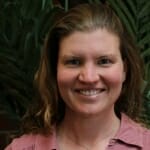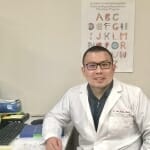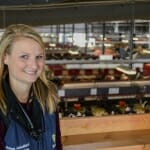New Faculty Focus: School of Veterinary Medicine
Fei Zhao: assistant professor, Comparative Biosciences, School of Veterinary Medicine
Hometown: Kaifeng, China
Educational/professional background: I received my Ph.D in Toxicology from the University of Georgia and postdoctoral training in reproductive and developmental biology in the National Institute of Environmental Health Sciences.
How did you get into your field of research? My strong interests in reproductive sciences and developmental biology. Zhao’s lab aims to understand cellular and molecular mechanisms underlying sexual differentiation of reproductive tracts.
Seth Eaton: clinical assistant professor, Comparative Ophthalmology, Department of Surgical Sciences, School of Veterinary Medicine
Hometown: Philadelphia, PA
Educational/professional background: VMD, DACVO

Seth Eaton
How did you get into your field of research? My path to toward academic medicine and clinical research was ignited by my involvement in preclinical drug development and comparative vision science as a member of OSOD, a research consortium co-founded by Dr. Chris Murphy, a Professor Emeritus here at the University of Wisconsin. Thus, some of my research interest here is focused upon ocular pharmacology and toxicology in small animal patients, particularly with respect to glaucoma. However, I am also actively involved in investigating comparative ocular oncology, specifically the diagnosis and treatment of ocular squamous cell carcinoma in horses, and ocular melanocytic disorders and tumors in dogs and cats.
Chelsea Holschbach: clinical instructor in Large Animal Internal Medicine, Department of Medical Sciences, School of Veterinary Medicine
Hometown: Baraboo, Wis.
Educational/professional background: Having grown up on a Wisconsin dairy farm, I aspired from a young age to become a large animal veterinarian. In order to pursue these aspirations, I studied Dairy Science at UW–Madison prior to acceptance into veterinary school in 2010. Following graduation, I completed a Food Animal Medicine, Surgery, and Field Services internship at Colorado State University. I returned to Madison in 2015 for a dual Large Animal Medicine residency and Masters program. In 2019, I completed my MS in Dairy Science and obtained board certification by the American College of Veterinary Internal Medicine. I then became a Clinical Instructor in Large Animal Medicine at the UW-Veterinary teaching hospital.
How did you get into your field of research? I have always taken a special interest in dairy calves. During my veterinary training at UW, I was fortunate enough to work with some of the experts in the field of dairy calf health who helped spark my interest in research. As a graduate student, my research focused on respiratory disease in preweaned dairy calves, and using lung ultrasonography to diagnose pneumonia and monitor response to treatment.
Kimberly Keil Stietz: assistant professor, Comparative Biosciences, School of Veterinary Medicine
Hometown: Manitowoc, Wis.
Educational/professional background: BS, St. Norbert College, DePere, Wis.; PhD, University of Wisconsin–Madison; Postdoc, University of California-Davis.

Kimberly Keil Steitz
How did you get into your field of research? I had an interest in developmental biology which grew during my time as a graduate student studying the growth mechanisms of the prostate. My interest expanded to include studying how environmental factors could interfere with developmental processes. So, I combined my graduate work and postdoctoral work to our goal now, which is to understand how developmental exposures to environmental chemicals can influence the morphology and function of the lower urinary tract.


